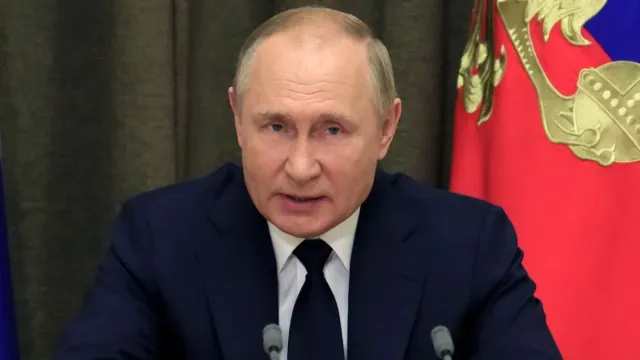- By Anushka Vats
- Tue, 19 Nov 2024 03:46 PM (IST)
- Source:JND
Russian President Vladimir Putin on Tuesday signed a new nuclear doctrine that says that a conventional attack on Russia by a country that is backed by a nuclear power, will be viewed as a combined attack on the country. This endorsement comes on the 1000th day since Russia invaded Ukraine on February 24, 2022.
The signing of the doctrine, which states that a major aerial strike on Russia could lead to a nuclear response, highlights Putin's readiness to leverage the country's nuclear arsenal to pressure the West into backing down as Moscow advances its slow-moving campaign in Ukraine.
Asked about whether the updated doctrine was deliberately issued on the heels of the US' decision to ease restrictions on Ukraine using its longer-range missiles to strike Russia, Kremlin spokesperson Dmitry Peskov said the document was published “in a timely manner” and that Putin instructed the government to update it earlier this year so that it is “in line with the current situation”.
Recently, US President Joe Biden allowed the use of long-range missiles by Ukraine to target the deepest part of Russia, the New York Times reported on Sunday.
The missiles could be used in the Kursk region of western Russia to defend Ukrainian forces against Russian and North Korean offensives, the New York Times quoted US officials as saying.
As per the officials, Ukraine will be allowed to use the long-range missiles, known as the Army Tactical Missile Systems, or ATACMS, the New York Times reported.
According to officials cited by the New York Times, Biden's decision is in response to Russia's surprise decision to bring North Korean troops into the fight.
Ukrainian President Volodymyr Zelensky has not confirmed the permission to strike but suggested on Sunday that more important than lifting the restrictions would be the number of missiles used to strike the Russians.
"Today, many in the media are talking about the fact that we have received permission to take appropriate actions," Zelensky said in his nightly address. "But blows are not inflicted with words. Such things are not announced. The rockets will speak for themselves."
Meanwhile, the broad language of the new doctrine seems to expand the potential triggers for nuclear weapon use, compared to the earlier version, which specified that Russia could resort to its nuclear arsenal only if "reliable information is received about the launch of ballistic missiles aimed at Russia or its allies."
The revised doctrine envisages that Russia could use nuclear weapons in response to aggression against its ally Belarus.
(With ANI and AP inputs)

